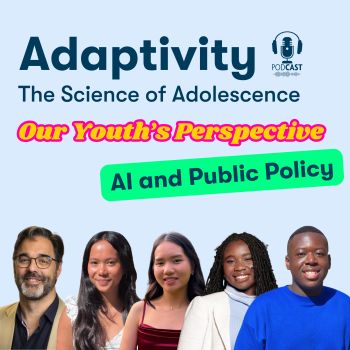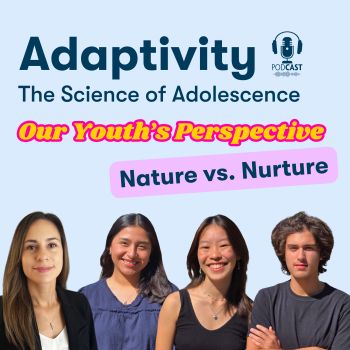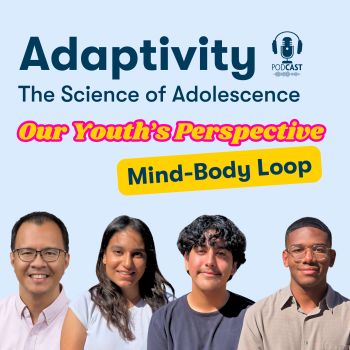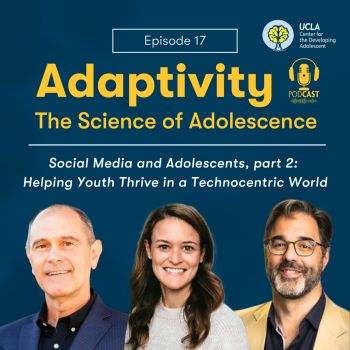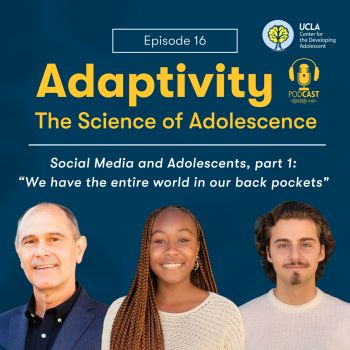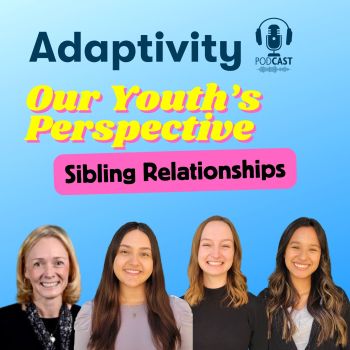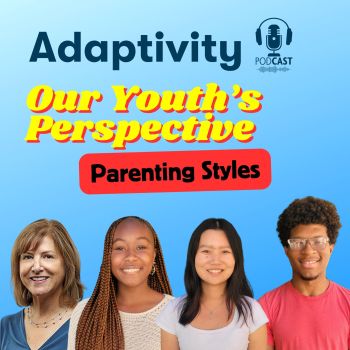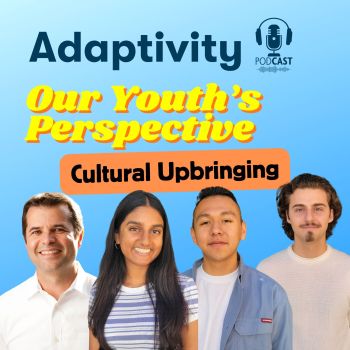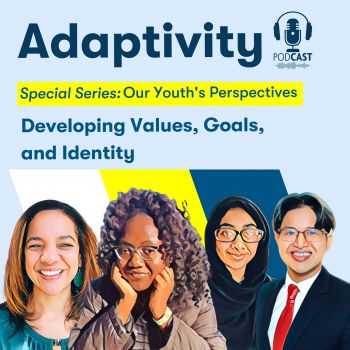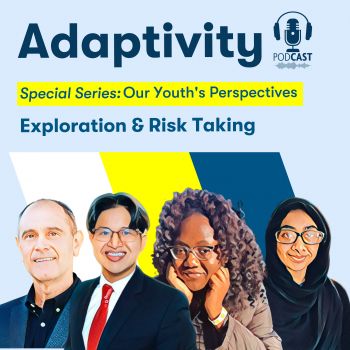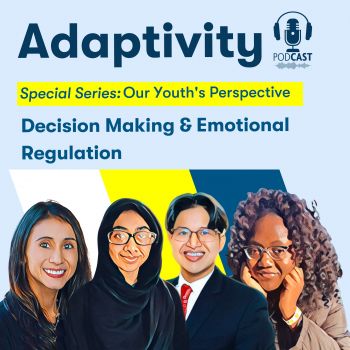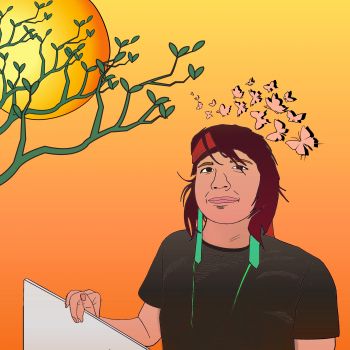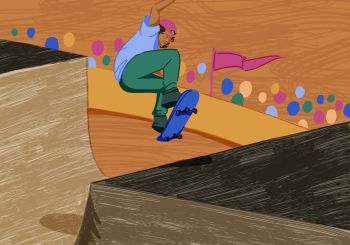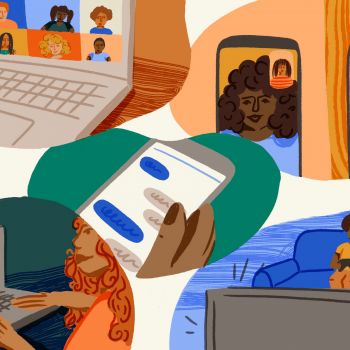Ron Dahl As parents or other adults who work for the benefit of young people, we want kids to be happy. Yet, it is easy to forget there can be value in learning how to deal with difficult emotions, too.
Lisa Damour The more we can reframe it as, yeah, here come the big feelings. They’re not all going to be good. We need to send out into the world kids who know what to do when this happens. I think hopefully the less anxiety provoking it can be for parents.
Ron Dahl When adults help teens learn to navigate through tough emotions, it can be an opportunity for growth and it can encourage resilience:
Zach Gottlieb I feel like a lot of parents want to like, jump in and get their kids through something. But what a lot of times is more helpful is literally just like listening to your kid.
Ron Dahl this kind of listening and support can help young people figure out for themselves how to manage their challenging feelings and to build confidence.
Makayla Dawkins Allow me to get all the things I need to get out before providing a solution, and kind of let me create my own solutions.
****
Ron Dahl I’m Ron Dahl, founding director of the Center for the Developing Adolescent, and this is Adaptivity, where we explore the science of adolescence, untangling misconceptions about the years between childhood and adulthood. We explore new insights into the rapid, cognitive, emotional and social changes that happen during these years, and how the developing adolescent brain is primed to promote healthy and adaptive learning.
As concerns about youth mental health have been generating so many alarming headlines over the past few years, it’s easy to forget that dealing with some intense and difficult feelings can be an important part of healthy adolescent development.
Changes in the way our brain processes emotions combined with the novelty, uncertainty, and high stakes of these years often amplify the intensity of our feelings–how thrilling a crush can feel…how devastating a breakup can be…or how the loss of a friend can feel like the end of the world.
On the one hand, these intense feelings can contribute to adolescent vulnerabilities–being overwhelmed by strong negative feelings. On the other hand this is also part of what makes adolescence a window of opportunity for learning how to navigate challenging emotions. It is important to understand how adults can support youth by helping them find and use adaptive strategies to face and manage difficult feelings.
These issues become challenging when the fears of parents and adults are stirred up by headlines. It can start to seem like a problem for young people to experience any kind of unhappiness or difficult feelings. Even a brief period of struggling with tough emotions can be too quickly labeled as a ‘mental health’ problem.
As adults who understand adolescent development, we need to help balance this narrative and say: kids need opportunities to face tough emotions …and adults can help to support them to learn from the experiences–in ways that lead to healthy, adaptive development.
We’ll be hearing from some youth voices later in the conversation, but first, joining me today is Dr. Lisa Damour. She’s the author of three New York Times best sellers: Untangled, Under Pressure, and The Emotional Lives of Teenagers. Dr. Damour co-hosts the Ask Lisa podcast, and she also works in collaboration with UNICEF.
And one of the things I really admire about her work is the way she bridges the science that informs these issues with her deep, clinical and pragmatic wisdom about interacting with young people, their parents and families, and weaving together the science that informs the clinical and the insights from doing this work. Connecting to the science is what’s so exciting, particularly for this podcast, where that’s so central to our mission.
Welcome to Adaptivity, Dr. Lisa Damour!
Lisa Damour Oh, well, thank you. And Ron, it is such an honor to be with you. I’ve admired your work for so long. So to be here in this conversation means a great deal to me, both personally and professionally.
Ron Dahl Thank you. So, I would love to start by hearing some of your thoughts in the space about this intense debate and discussion about the mental health crisis in adolescence and what we might be getting wrong in our understanding and communication about these compelling sets of issues.
Lisa Damour So, okay. The adolescent mental health crisis. It’s a big thing to unpack this because there is a reality that teenagers are suffering at a scale that is not what we have seen before. It was ticking up before the pandemic. The pandemic made things worse. I don’t think there’s any question about that. And so we do have a lot of teenagers who are in a lot of emotional pain. And that is coupled with the fact that it’s very hard to find clinicians. And so when the need surged in the pandemic, we were not in a position to quickly scale up the workforce to meet that need. So the adolescent mental health crisis is real. There is much work to be done.
Side by side with that, it’s important to not confuse the expectable distress that comes with adolescent development with a mental health concern. And a lot of teenagers are doing just fine, if not thriving. And really, you know, doing extremely well now. So when we talk about the adolescent mental health crisis, there’s a lot of layers in that and it doesn’t tell everybody’s story. And the story it tells is a complicated one.
Ron Dahl So, one of the themes that emerges both in your writing and you’re speaking about this, and I think really from the evidence base of the science looking at this is that the the number of young people who are struggling with some levels of difficult or distressing feelings and the number of young people who are struggling with disorders that really require being identified as a clinical problem are not the same thing.
Lisa Damour Yeah. I mean, I think you and I live in this world where we know these are distinct, but the media doesn’t make this distinction, I think, nearly often enough. And so, so many of the headlines over the last couple of years especially have rolled up adolescent distress with adolescent mental health concern as though they are one and the same. And I’ll just start to run down why this is so problematic.
You know, first of all, it means that we’re not making meaningful distinctions between kids who are having a rough day and kids who need and deserve significant and, you know, excellent psychological services. And I worry that it dilutes our attention for the kids who actually do need the professional care.
Second, it terrifies parents, right? I think all the time about what must it be like to be a parent for the first time of a teenager? Right. This is your first teenager. And because that kid’s a teenager, they are having meltdowns every once in a while. And how do you look at that and not think, is this expectable or is this an adolescent mental health crisis in my kitchen, and I’m reading about adolescent mental health crisis all the time, so that’s really scary.
Third of all. And then I’ll stop my list, but I bet I could go on. I wonder how it feels for teenagers, you know, to see headline after headline about how badly they’re doing, how damaged they may have been by the pandemic, how terrible the trajectories are. Teenagers live up to expectations. They live down to expectations. You know, I worry sometimes that if the narrative around adolescence becomes a narrative of they are broken and suffering, we’re going to not do right by the young people in our society.
Ron Dahl Thank you for those three framing aspects of this set of issues. And I want to move toward one of the things you referred to here in terms of the parental emotions and responses. And that is that when we naturally as parents are frightened by these emotions, the levels of emotional distress or emotional outbursts or erratic behavior related to these emotions, it’s natural to want to rescue young people from their distress and emotions.
And yet when we’re trying to rescue them, it’s actually so often counterproductive for everyone in those situations.
Lisa Damour Totally, totally counterproductive. And yet, Ron, you know, one of the things I don’t know if you had this experience, like you get all this training, you get all this theoretical training, you work as a clinician and then you raise your own kids.
Ron Dahl Yes.
Lisa Damour You know, and I can tell you as the mother of two teenagers,, if I did not have all the training I have, I would feel quite frightened. And so I really get that when your kid is suffering and especially if it feels scary and especially if you don’t have the benefit of the kind of training that we enjoy or the broad understanding of adolescence that we’re just, you know, is our job. I have so much empathy for the parents’ impulse of ‘let’s make this stop.’ Like, I want this to stop both for the kid and maybe also for the parent at times.
And I agree with you completely. There’s much of the time where that’s actually the opposite of what needs to happen. But I just want to take a beat and just say, oh, my. As an adult who has been in that seat, I get it. Where you’re like, I would give anything to roll back this moment or to keep it from happening as it’s unfolding right here, right now in our house.
Ron Dahl Oh, I agree 110 percent. And I think that even having spent decades studying these issues, you know, working with young people and families clinically and a lot of experience parenting through adolescence and during adolescence, it is moment-to-moment still so humbling. It is so hard to get it close to right. And the small mistakes evoke strong negative reactions. And there’s another point that comes up in what you’re shining a light on is that often it’s not what young people want.
Ron Dahl I want to share some thoughts from Zach Gottlieb, the 17-year-old founder of Talk with Zach, a Gen Z movement and platform that harnesses the power of young people all over the world to engage in important conversations that change the culture and openly address everything related to the being of Gen Z. Zach shared some thoughts with us about dealing with difficult feelings. His mom’s a therapist and he wrote recently about how she doesn’t try to fix things when he’s feeling uncomfortable emotions.
*****
Zach Gottlieb If I’m anxious because of a test, then it’s like, okay, like you could sit with that. You could go do something about it, take action, like go do your work and also understand that it’s normal to have anxiety about something like a busy school schedule coming up.
I feel like doing small things, even just like going for a walk or like talking to someone and not being in denial about what you’re feeling and understanding that it’s normal and taking steps to remedy it, but also knowing that you can’t just get rid of a feeling like sometimes they’re going to be there and there’s nothing you can do to make them go away.
Like, it’s one thing to try to get past a feeling like, say you’re trying to get over someone or you want to, like, reduce your anxiety or something like that. Then there are steps you can take that are, like, healthy, like you could go study or you could like obviously, like not, like, look at their Instagram or something like that. But if you’re telling yourself that you’re not feeling something, I think that’s a lot different. But I feel like we’re confusing the daily, ordinary discomfort with the more serious, like, protecting your mental health. And sometimes you’re not going to feel, like, perfectly comfortable. And I think it’s just like knowing that that’s okay.
You know, if you’re bottling up your feelings, you’re kind of going with the culture, going with what people are telling you to do if you share them, if you live in the discomfort, that is hard to do because not many people do it. And that requires you to actually face what’s real. And I think that is a lot more difficult to do than pushing things aside.
I feel like a lot of parents want to like, jump in and get their kids through something. But what a lot of times is more helpful is literally just like listening to your kid. And if you listen to them and, like, not try to solve their problems, but just, like, hear them out, that can be really healing and help them feel seen, but also help them get through it. It’s nice to like, share it and get it off my chest. And it’s okay to feel bad.
We live in a generation where parents are trying to, like, fix everything and they’re, like, super-involved, way too involved in their kids’ lives. And what happens then is they a lot of times project their anxiety about their kids’ well-being onto their kids. As soon as you start trying to solve their problems and maybe, like, even if you freak out a little too, I think that is definitely not something that’s going to be conducive to them feeling better in the situation.
Because if you’re trying to solve their problems, not only are they not going to learn, but they’re also going to get the message that what’s happening is not okay and that you need to solve it immediately.
Also, if you flip out, your kids can be stressed, worried, scared, like whatever it is. And then also they’re going to flip out the next time something like that happens because they’re going to feel like there’s something really wrong with any small discomfort.
It’s okay to not be okay. And as soon as you make it seem like it’s like something bad is happening, if you’re not perfectly fine, like that’s life, like you’re going to hit road bumps along the way. And I think it’s a very important skill to know not only how to react to it, but how to sit with those feelings.
*****
Ron Dahl Wow. He captured a lot in those descriptions. Lisa, where would you like to start and sort of responding to that from your wealth of experience working in this space?
Lisa Damour Oh, it’s perfect, right? I mean, it’s so perfect. And I love hearing it from a young person, you know, just laying out. What happens? I’ll pick up two things. There’s so much in there, but I’ll pick up two.
One is the piece about I think you said if you flip out, your kid’s going to be stressed. And I think there’s so much wisdom in that if a teenager’s already got a problem and they bring it to us, the teenager’s already stressed about the problem they have. And then the reaction of the adult for them can make things better or worse. So if the adult can just be a steady presence invested in the problem and invested in the teenager’s efforts to deal with it or sit with it as Zach says, I think things can quickly move in a really healthy direction. If the adult reacts at a very high level, I think there’s a couple of things that unfold. One is it actually makes a problem feel worse to the teenager, you know, and Zach said, like, it makes it seem like this problem actually is really serious and needs to be addressed right away. And so it may take a problem that the kid was like, I don’t know, this seems like a 15-year-old sized problem. And then they’re like, holy moly, it’s a 52-year-old size problem. It’s way bigger than I realized. So there’s that.
The other thing and I hadn’t thought about this so much until he just said it, the teenagers now also worried about the parent. You know, the parent is having a big, strong emotional reaction. And so the teenagers now having to figure out what to do with that on top of whatever the teenager felt at the beginning. So that’s one issue.
The other issue which he speaks to so beautifully. Is. We so often don’t give teenagers what they really want, which is just for us to listen and just for us to offer empathy. I think so often when teenagers come our way with concerns, the reflex and I have this reflex myself as a parent is to get into problem solving or asking questions or redirecting or wondering why this even happened in the first place. And the thing that is such a, like, a terrible irony in this is that so often parents are saying like, how do I get my kid to open up? And then when the teenager does open up, the parent does the thing that makes the kid think, why did I bring this up with you?
Ron Dahl Yes. Yes.
Lisa Damour And I think it’s so awesome that teenagers keep giving us chances to try to respond to them in useful ways because so often we step in it.
Ron Dahl Yes. Another thing that comes out in that example and what something you referred to earlier is that. One of the things we want to convey as parents in these situations is that they matter to us, that we care deeply about them, that we are seeing and hearing them. And that’s hard in the best circumstances. It’s even harder when they’re having a meltdown or struggle or their communication isn’t being very effective. And there’s this combination of what are our words saying and then what are our emotions saying.
And so some of the best moments, I think, when parents can do this is they’re conveying interest and value and and and wanting to understand and relating to which signals the really important message, “You matter, I care about you.” But doing it without implying the judgment or criticism that can come across and when the parents are scared–and how do we not sometimes feel scared in these situations?–and so even if we use the right words like a question about something you’re worried about, it’s the emotion that they’re often tuned into much more than the specific words.
Lisa Damour I love that. I’ll tell you the language I use clinically to describe that. I talk about it: lyrics versus tune.
Ron Dahl Yeah.
Lisa Damour You know, they hear the tune.
Ron Dahl Yeah.
Lisa Damour The lyrics, the words you say actually may mean very, very little. And it’s funny because something else I don’t know that I’ve ever talked about with somebody is, like, the ways in which humor can then play a really useful role in parenting teenagers because it can let you get at something hard. But if you’ve got a good, gentle, non-sarcastic sense of humor, it can keep it from feeling too fraught.
Lisa Damour And that playful aspect, I mean, teenagers are so funny. And so if the parent has some of that in them, you can get a lot of good done talking about difficult things if you can keep it a little light.
Ron Dahl: So it’s so interesting because what you’re describing, I think, really vividly, is the paradox in these moments that on one hand, it’s so fraught and dangerous and difficult, like how do you get it right as a parent? But if you flip it, there’s such opportunity in this moment to connect, to, reach across the dissonance and negative and be helpful.
And again, with huge amounts of empathy for parents about how precarious this feels and how difficult it can be, especially, you know, you know, the first time you’re doing this with a young person or without a lot of experience, and yet focusing on the positive opportunity can be a win win if you can, because you can begin to experience it that way. If you can find a moment of humor, if you can be playful, if you can be curious about what they’re experiencing, it can take that spiral from what was going to quickly do a negative meltdown with both people to a connection that they feel heard, understood and and and that you believe they can handle it.
How can we help parents with the in many cases, very valid fears and worries about what can be happening and and something that’s more than a meltdown and something that’s more than just the normal dynamic stresses that young people are going through? How can we help connect the evidence and the science and the clinical wisdom to support parents to be able to be more helpful and supportive and make good judgments in these situations?
Lisa Damour I think part of it would be to tell them to stop reading the newspapers. And I’ll tell you what I mean by that. The nature of media is they’re looking for the next new thing and they’re looking for the most exciting thing. And frankly, they’re often looking for the most frightening thing because it’s the most clickable and. I feel so sad by how often or about how often I have conversations with parents of 8 or 9 year olds who have been thoroughly terrified by the media about what lies ahead when their teenager becomes a teenager.
Ron Dahl Right.
Lisa Damour And very often the narrative of like, I’m going to do all this good parenting, I’m going to love this kid, and then social media is going to come along and destroy them, and there’s nothing I can do to help. I mean that that’s often what I am hearing from really thoughtful, really, you know, devoted parents. And so I worry I mean, I’m not saying social media is a non-issue. It can be really bad for kids. I don’t doubt that it can also do plenty of good or be neutral.
But what I wish to do, to answer your question, like how can we reassure parents? I think what we know is very boring. It’s very well established, so it’s not headline worthy, is that parenting matters. And by parenting, you know, when when we, you know, boil it down warmth and structure go hugely far in terms of protecting mental health, promoting mental health, minimizing mental health concerns if they do arise that if you like your kid, not just love them but like them, find ways to have fun with them, that goes really far.
If you have rules and expectations that are clear and fair and they are enforced on a regular basis, that goes really far, that I worry that parents feel like there are all of these outside forces that they cannot control and that will do harm to their kids and they’ve gotten nothing in their corner to work against that. Whereas you and I know that’s not true, that even things as simple as sleep, you know, if you can get your teenager to be sleeping 8 or 9 hours a night and create the structured environment that makes that possible, that alone goes so far to protecting mental health over time and conferring all sorts of wonderful benefits.
Ron Dahl Thank you. So there are at least three things to unpack in what you just said. And let me start with one framing issue, because several times in this conversation you’ve talked about teenagers and and yet I know from, you know, you know, talking to you reading your books, which are wonderful. When you say teenager you are not meaning 13 and beyond that window from around 9 or 10 for some young people when they’re beginning to have some of the changes occurring up to 13 is in some ways such a powerful window of opportunity and and so that we use the word teen or teenager.
And yet when we’re thinking about this broad developmental set of developmental changes that are often starting much earlier and and so it’s not just waiting for that you know that these later more challenging times that are going to become but starting to incorporate some of these approaches earlier and and some of these meltdowns are starting at 10 or 11 and 12 as well.
Lisa Damour Absolutely. It’s interesting. Untangled my first commercial book. There’s a photograph of a girl who looks a little youngish. And my editor was like, Is she too young? And I was like, no, no. Parents should be picking this book up by age ten. Um, because, yeah, you know, adolescence begins by 10 or 11, no question. And we’ve always known that.
But again, I think a lot, Ron, about what we know on the clinical and academic side and what’s getting communicated to the general public. The general public doesn’t know this. And so then they’re 10- or 11-year-old starts, you know, finger quotes, “acting like a teenager.” And that’s scary to them. They thought they had more time. They don’t understand why this is all happening so prematurely. You know, and again, I would say that’s a failure on the side of those of us who hold this knowledge in terms of getting it out to the people who need the knowledge.
Ron Dahl Yeah. And I think some of the science is suggesting that early adolescence may be a particularly important time to start creating some of the positive patterns of interacting in new ways that are maybe easier to introduce this combination of warmth, warmth and structure, this combination of having high standards, but but having these, you know, connections with a little less need to control and influence.
And part of this comes back to one of the things that I know you focus on a lot in your work is the importance of emotions and feelings and the intensity of these emotions and feelings that are amplified in adolescence and some of that intensification, amplification, whatever one wants to call it, is beginning much earlier than 13 or 14. It’s interesting to see the advances in the scientific understanding about how and why these changes are occurring, as well as how from a clinical and parenting perspective to incorporate that into ways of supporting young people in these earlier ages.
Lisa Damour Yeah, I do think about how it’s so useful for parents to understand. More about what’s unfolding neurologically for young people, and that there is a really powerful shift happening at the level of the brain that I think helps to neutralize some of what’s happening in the house, because I think parents can feel like, why is my kid freaking out or why are they acting this way, and understanding more that there’s a powerful process afoot.
And so it’s interesting, because I want to both honor that there’s so much interesting and important happening for 10, 11, 12 in terms of moving into adolescence and their brain changing and them thinking and increasingly, you know, interesting ways and powerful ways. And then also, they’re still really young.
Ron Dahl Yes. Yes. They still have one foot firmly in childhood as they’re stepping into all these adolescent issues. And, you know, one of the things that comes up in this space is the tendency to problematize or pathologize these strong emotions as if it’s something wrong with the child, adolescent or with their brain.
And I think increasingly what we’re understanding, which fits with clinical insights, is they need practice experiencing stronger feelings and dealing with new levels of emerging understanding. And if we think of this as part of the practice of learning how to deal with more complex emotions and intense feelings that are going to continue to amplify during this period of time, then it can seem like something we need to stamp out or wait for their brains to recover from this problem. And it’s the opposite.
This intensifications of feelings are part of a learning window. It’s about learning about self and other and some larger ways. And so moving from, you know, saying there’s this broken teenage brain that causes problems and you’re going to wait it out to recognizing this is a part of these rich learning experiences. They’re rough-edged at the beginning. But that’s just part of the process of these early learning experiences.
Lisa Damour: Absolutely. You know, and it’s so fun. I mean, this is why I like teenagers is they’re just so vibrant. I mean, stuff is intense and I love being around that kind of energy. And I’ll just see you and raise you on, you know, the opportunities that are presented by the onset of more powerful and often negative emotions. You know, so much of my recent book is really about regulation. You know, the teenagers are going to have these feelings. They’re very powerful. They need to be regulated and there’s better and worse ways to regulate them.
And what I’ve been trying to convince parents of when I’ve been talking about the book is I’ll say, look, we want to try to take every moment when our teenagers in distress as an opportunity to see how they’re coming along with learning how to handle their distress and whether they’re learning to use adaptive strategies like talking about it, or going for a run, or putting on their sad playlist and crying along to it for a while until they feel better. That these are actually just, you know, fantastic moments where we just get to observe and support the development of a repertoire that they’re going to need for their whole life around what to do with a painful feeling.
And they are opportunities. And I think I’m with you. The more we can reframe it as, yeah, here come the big feelings. They’re not all going to be good. We need to send out into the world kids who know what to do when this happens. I think hopefully the less anxiety provoking it can be for parents.
Ron Dahl Yeah. So I love the way you do this in the book. And I want to and I want to dive a little more deeply into what you just described and this idea of what are adaptive approaches to dealing with these intense feelings and sometimes surprising and overwhelming feelings and the tendency to the tendency of many people in the public as well as even some professional people, is that they think it’s about regulating emotions as if it’s squashing down the feelings that you turn them off or you’ve regulated them down, when in fact, I think increasingly and I like the term you use, you know, bringing the emotions under control or under influence, because I think that’s a better that’s a more accurate image. It’s not about squashing or suppressing the feelings or pushing them into a box. What we regulate is our behavior that’s connected to those emotions.
Lisa Damour: Oh, I like that. I like that a lot.
Ron Dahl And I think that what’s adaptive is, is not and I think it’s not quibbling about words. It’s actually supporting what you describe so well in many of the examples in your book is helping young people find what’s adaptive for them, for the particular feelings and situations that they’re struggling with. And as you say, as you know, you’ve described in your books, you know, the range of ways from distraction to self-comforting to, you know, finding another way to engage those feelings can be so rich.
The other part of this is that from the parent or adult trying to help. We also don’t want to regulate–it’s helping them develop their own adaptive approaches to these rather than just squash what they’re trying to express and deal with.
Lisa Damour Yeah, no, absolutely. And just to extend some of that, you know, I love the focus on, it’s the behaviors, right? It’s the choices that get made in the face of that emotion about how to manage it, you know, whether it’s talking to somebody or smoking a lot of marijuana. Right. I mean, those are choices and one’s better than the other when it comes to long term outcomes.
Another thing, just in thinking about supporting adults as they help young people with behaviors around the management of emotion. Our culture is very tipped towards favoring expression of emotion, talking about feelings, helping kids to talk about feelings as a way to help them, you know, get through painful things. And there’s value in that. But, in the book, I really put and you mentioned this, you know, helping kind of bring them under control, bring them down to size. We really put that on equal footing. Right.
And I made a point in the book of putting that on equal footing because I actually don’t think we have valued enough that distraction, you know, in the right dose can be really useful and comforting works and problem solving works and that it’s not always the kids need to talk more about what they’re feeling. They may not want to or it may not be helping. They may be becoming kind of ruminative about it. But part of what I hope to bring across in my work is this idea of, like, the repertoire is really big and it’s not all about expressing the feeling. it can be other approaches, too.
Ron Dahl Yes. And that set of issues you just introduced now about the range of ways and that short, short bursts of distraction or just letting things calm down a bit can be so helpful. And. It introduces another layer about distraction versus dealing with in more direct ways is the worry and rumination. As there’s been, you know, so much work that’s, in some ways kids that distract themselves, which seems to many people as maladaptive actually can be positive in the right amounts and doses.
And that leads back to what you’ve emphasized a number of times already in this conversation and in your book is Sleep. Because one of the things that happens, even for young people who find distraction strategies very naturally during the day, is they go to bed and now there is no good distraction strategy. Or if you use a distraction strategy, then you’re going to be interfering with going to sleep. But now all of those feelings bubble up and they can lead to this–the worry and rumination component and then bleeds into sleep problems or trouble falling asleep.
And we have more and more data every year about that. Sleep isn’t the cause of all of these physical and mental and social and behavioral problems, but it is an amplifier of these emerging difficulties.
What are some good approaches for parents who recognize this and for young people who recognize they would be doing better on more sleep, but they have trouble achieving that.
Lisa Damour You know, if I have a young person who’s not sleeping, I’ll do an evaluation of what might be getting in the way right where their phone is, how much, you know, caffeine they’re drinking, when you know how active they are during the day, whether they’re outdoors a little bit. And I think I do use I’ll say, you know, let’s try this. I’m not sure it’s going to work, but it really stands a good chance. What if you and then I’ll make a recommendation. You know what? If you shut down your phone, don’t take it in your room. And also, what if you work out pretty hard just to get your heart rate up for a little while each day? And I’ll say, you know, studies tell us that this should improve your sleep. So I’ll say all of these things that are true. But I also really express my own confidence that this may just work. And I think there’s power in that
Ron Dahl Yeah. Thank you. And I want us to also, in this conversation, give some attention to the more substantive reasons that so many parents can become compellingly concerned and frightened and worried. And they have vivid examples of terrible things that have happened. And it’s hard not to have those influence emotions and feelings. And so how can we help parents know when to contextualize the normal range of just things that happen and not problematize them, but yet recognize that there are some really scary and serious things that emerge in this window of time?
Lisa Damour Yeah. No. So I’ll tell you the two guidelines that I offer parents and see what you think, see how these fit with your thinking. So one is, I say to parents, we don’t expect teenagers’ moods to go to a concerning place and stay there. You know, we do expect teenagers’ moods to go all over the place, you know, to be very up and very down moment to moment. That’s quite typical.
But it’s pretty unusual in my experience for a teenager to be low day over day or numb day over day or paralyzed by anxiety, day over day. I mean, even a week of that is a very long time for a teenager. And so that’s one thing I can say to parents, You know, if your kid comes in and is in a really bad mood and then an hour and a half later doesn’t even remember what they were upset about, you’re probably looking at typical adolescence, but we don’t expect–also anger. For kids to be really cranky and prickly for days at a time is rare.
The other guideline I like to point to is what we were talking about earlier, which is the behaviors that are used to regulate emotion. So what we want to see is a set of behaviors that bring relief and do no harm. And we don’t want to see behaviors that bring relief but are costly. So substance abuse, self-harm, being incredibly hard on the people around others, you know, around oneself, taking it out on oneself. And another way, you know, being down on oneself that those things will all bring relief. But they’re very, very problematic, you know, especially over time. So those are the things I encourage caregivers and parents to watch out for. What do you think?
Ron Dahl Yeah, I think those are really good guidelines. And as you refer to in many ways, the concerns about anxiety and depression are when they’re interfering with functioning. It’s the avoidance that’s not going to school, not doing social interactions and depression, you know, that no longer seeking out rewarding experiences.
And I want to come back to, I think what’s emerged as a very central set of issues, is about the intensity of the feelings and emotions that are occurring. And you devote a lot of your work and your attention and your writing to these factors. And we use these words, feelings and emotions or, you know, overwhelming and intense and strong. But I think there’s a lot to unpack in that space. You know, why are these feelings so strong? Why are they so difficult? Why are they often so confusing? And how can we help young people manage them?
Lisa Damour You know, some of it I do think is neurological and informed by the move into puberty. Um, what I will say here is let’s also not underestimate the novelty and intensity of a lot of experiences that suddenly hit you when you’re a teenager that, you know, here you are, you’re 14-years-old, you’re in the ninth grade. And it’s been made clear to you that how you did on today’s test in math may have implications for your grade in math, which may have implications for where you can apply to college. Right. That is so loaded.
And then like romance and crushes and liking people and having them not like you back, like this is novel and intense and very loaded. And so I think part of what we like the wonder of adolescence and also the extraordinary like demand of being a teenager is that you are changing so fast, growing on so many fronts and things can often feel really fraught, really freighted in ways that are new to you, that is different from being ten years old.
Ron Dahl So one of the things at least that you talked about in your book that I think is so important is that some of the maturation that we want young people to to acquire actually is embedded in dealing with distress and difficult feelings, that it is actually part of a maturation process.
And I’d love to hear you talk about that and how that might help us think about someone being sad or someone being really frustrated or very distressed for a period of time. Not only that it’s okay, but that it actually has some benefits.
Lisa Damour I’ve thought of myself of late of being, like, PR for negative emotions because they get such bad PR, but I’m like hopefully on the PR positive side.
So if we set aside the fact that it’s very painful as a parent to watch your kid be in distress, then we can actually get to some of why it’s really often helpful for young people to experience distress. So there’s simple things like it’s information, it tells them how things are going. You know, if every time they hang out with this particular kid, they feel really awful afterwards. That is really good information and they should take that information under advisement. Another, though, is that it helps them to mature.
I have cared for kids who, you know, they just have gone through horrible tragedies. Like a lot of my practice has been around this, where they’ve lost a parent or a friend. And it is awful to watch a teenager have to do the work of coming to terms with losses like that. But the level of maturation that arrives as they do is amazing.
And then, of course, going through hard things actually is what helps us to build empathy for others and being able to be in touch with our own inner states and sit with them. Actually, back to what Zach said, you know, sit with them, be curious about them, tolerate them. Also it helps us better connect to other people because then when they’re in pain, we’re like, “Oh, yeah, yeah, okay, I see that and I can be with that and I can imagine what that feels like for you because I’ve felt it myself.” And so there’s value upon value in distress. And I feel like that statement could not be further from the current cultural discourse, which is basically saying distress is bad. It’s almost always pathology. And let’s see what we can do to make sure it doesn’t happen.
Ron Dahl What kind of advice do you give parents when they want to be helpful, when there’s some big, difficult struggle a young person is dealing with and they want to be helpful and supportive. And young people want empathy and support, but not in the way that intrudes or disrupts or tries to fix. How do you help parents in that difficult space?
Lisa Damour It’s really hard, right, when your kid is talking to you or upset and you don’t know quite what to do or you want to offer guidance. I think that mostly what teenagers want is truly just for us to listen. And listening, truly listening is actually pretty hard to do.
And so one hack I have developed for myself to really listen is I imagine that my kid is a reporter and I’m her editor and she’s reading me the article of her distress. And when she gets to the end of the article, it’s my job to offer the headline to the article. So I’m not adding anything. I’m just distilling what is being said down to hopefully its essence and I try to offer it humbly or tentatively. But I find that gesture alone goes enormously far and makes teenagers glad they opened up and makes them more willing to open up with us again.
Ron Dahl Lisa, thank you so much for joining us today.
Lisa Damour Ron, thank you so much for having me.
Ron Dahl A note: if you are concerned that your child or adolescent is struggling to cope with difficult feelings, don’t hesitate to reach out to a professional.
*****
Ron Dahl Joining me now to share her insights about youth navigating their emotional lives is Makayla Dawkins. She’s an inaugural member of our Youth National Scientific Council on Adolescence, or YNSCA – part of the Center for the Developing Adolescent. Makayla is working towards her Masters of Public Health/MPH. Welcome, Makayla Dawkins.
Makayla Dawkins Thank you for welcoming me. I’m so glad to be in community today.
Ron Dahl Makayla, you’ve already come through some major life challenges. Can you give us an example and talk about what helped you navigate your feelings during those challenges?
Makayla Dawkins When I hear this question, a big challenge that I could think of navigating is anxiety, specifically from high school to college, even to graduate school.
I remember beginning to take standardized testing and experiencing an uneasy feeling. At the time, I didn’t know about accommodations. I didn’t know how to speak about it because mental health was something I was engaged in, but I really wasn’t comfortable with speaking to my educators about.
So going through that journey to college and changing it into something positive, my senior year, I was able to talk about mental health and I even led a change project about it with the Bezos Scholars program and then going to college and addressing this testing anxiety, getting accommodations for it and making my education work for me made this experience very positive.
Ron Dahl Yeah. How did adults in your life help when you were having a rough time?
Makayla Dawkins Yes. So I did have a mentor. She oversaw our college success program and early, early college entry program. And, you know, we did have a meditation room that she kind of, like, oversaw. In addition, I did have guidance counselors I could rely on even my everyday teachers. A teacher that I remember also vividly is my art teacher that I still keep in touch with to this day. And she introduced me to art as a therapeutic mechanism to some of my testing anxiety. So my mentor and my art teacher on top of the other supports that I had were very important at that moment in life.
Ron Dahl Yeah. You mentioned having to deal with other adversity. Can you share a bit more about what else was going on at that time?
Makayla Dawkins Yes. So my first year of high school, actually three months into school, I had a loss of a parent. So that was such a major loss at the beginning of one of the most pivotal and transitional periods in life. And on top of that, I also was experiencing coming out as a queer-identifying person. So going through two parts of my identity, you know, my sexual orientation, sexuality, and then my identity in my family. On top of being a big sister and being the eldest in the house, those two changes in my life were very, very big for me.
Yeah. Wow. So on top of the testing anxiety, which you’re focusing on as one of the things you needed to overcome, these other things were probably piling on or amplifying all the emotions underneath or connected to those experiences.
Ron Dahl And Makayla, I’d like to ask can you suggest some advice that you might give other young people if they find themselves in that kind of space trying to navigate or manage or get through some of those really difficult moments?
Makayla Dawkins Yeah. For me, I had to learn the hard way. I tended to use, as much as I love my academics, service and other activities, I didn’t want to sit with my emotions and kind of like, understand myself. At the most simplest level, I knew I felt angry. I knew I was frustrated, but I had to do something that I now identify as root work. Why am I feeling angry while I am experiencing grief or experiencing confusion about myself? What things come up for me? So writing really helped me get through it and questioning the questions that I had. So just going through just all the emotions, because I realized if you continue to distract and you don’t address the feelings that you have or you don’t try to figure yourself out, um, it’s harder for others to kind of understand you, and it could really impact your interpersonal relations.
I remember my grandparent who was my guardian through my adolescence, and I still live with her today. By me ignoring or not speaking to her, it did me a disservice because the adults, even around me and my grandmother that I live with couldn’t help me because I didn’t even know how I felt myself. So for me, it was writing. I know talk therapy was also really important. I was talking to someone the other day about, I would knock on people’s door at night before they go to bed and talk to them as well. I would talk to my friends and most importantly, I also would connect with my family, specifically my little brothers, as we had,not the same experiences, but similar journeys together. So that helped us build bonds and connect even greater.
Ron Dahl Thank you. So you really allowed yourself time to reflect and journal and to share with others when it felt comfortable enough to be able to do that, to push through, manage, get around those feelings rather than avoid or rather than just sit in those feelings.
What would you tell adults who want to help? Parents, grandparents, coaches, teachers, if they’re trying to help some young person who is in a situation like you were in, what advice would you or suggestions would you give them to help?
Makayla Dawkins Yeah. So one thing I did tell my grandparents my grandma was living with just to listen and not really respond, but listen and allow me to get all the things I need to get out before providing a solution. Um, and kind of allowed me to create my own solutions. One, because I know myself firsthand and when I’m going through, but also, second, I don’t want to blame grandma in case the solution doesn’t turn out the way that I want it to. You know, it was really important for me to ask questions, “What did you do when this happened?” And really not give me the answer, but kind of like guide me to my own answer. So that’s one thing I would tell adults.
I would also tell them just to, as hard as it is for them to kind of like go through the storms with us, especially after they pass this stage of life just to be there and be accessible. Um, impressions really matter and if you kind of like guilt, an adolescent or if you shoo them away or you’re not accessible, it can really be harmful, especially if they trust you. So it’s really important to be there. And if you can’t be there to find someone else that can be there for them and just to not ignore or to put on the back burner, as I would like to call it.
Ron Dahl Makayla Dawkins, thank you so much for sharing your insights, experiences and wisdom with us today.
Makayla Dawkins Thank you for having me. I’m so glad to be here and share my story.
*****
These are challenging times—for adolescents and for the adults wanting to help and support them. On one hand, many adolescents are struggling with anxiety, depression, and other serious mental health problems. On the other hand, we can recognize that a key aspect of healthy development in adolescence involves learning how to navigate and manage difficult feelings. In both cases, supportive adults can begin by acknowledging the difficulties and helping young people find healthy ways to manage their intense feelings. As Lisa Damour described, there are helpful guidelines for parents trying to decide when these are likely to be normative challenges and when there are signs of more serious problems that may require professional evaluation and treatment.
Listening respectfully, with authentic concern, and asking how we can help is often a good place to start. Not to try to jump in and solve things in the situation or resolve the difficult feelings, but rather to find ways to support youth to manage their way.
This can be a difficult balance. As parents, we do not want to see our children or adolescents struggle–it’s natural to want to rescue young people from their distress. Yet, efforts to save youth from their feelings may be preventing them from critical learning - and it may be communicating that we lack confidence in them and their abilities to deal effectively with the challenges.
The intense emotions of our adolescent years make this an important time to learn adaptive ways to navigate through tough times. These skills are learned through lived experience. Facing one’s fears, sadness, or distress successfully can build confidence and resilience. Avoiding what one fears can be a pathway to more serious impairments in anxiety disorders - such as avoiding school or all social settings.
Clearly this does NOT mean throwing young people to the wolves. It means that instead of shielding our kids from emotional discomfort, we offer warmth and support, listening and caring, to help them find ways to grow and mature through challenges. As adults, we can listen, we can reassure, we can give young people space to feel big feelings–and experience the reward of successfully managing these and feeling admired for that success by parents, peers and others.
Feeling strong emotions–good feelings and bad–can be an opportunity for young people to build positive coping strategies and support networks. Parents can monitor, scaffold, and support these healthy learning processes. This can also help youth feel more comfortable asking for help when they need it.
Exactly the skills they’ll need to make their way through adulthood.
*****
If you’d like to learn more about the science of adolescence, visit us at Adaptivitypodcast.org, or share your thoughts through the contact information at our website or by using the hashtag #AdaptivityPod. Our podcast is produced at UC Berkeley for the UCLA Center for the Developing Adolescent. Our senior producer is Polly Stryker. Our producer is Meghan Lynch Forder. Our engineer is Rob Speight. I’m Ron Dahl. Thank you for listening.

_770_770_80_c1.jpg)
_350_350_80_c1.jpg)
